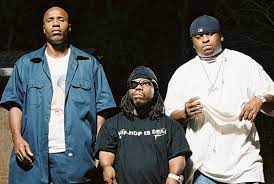Although I have familial ties to Memphis, Tennessee, on my mother’s side, the moment I heard about the brutal beating of Tyre Nichols, I knew that such facts mattered little in analyzing this senseless tragedy. Ironically, my new home, Houston, trumps my connection to Memphis; let me explain. When pondering this tragedy and what it means specifically to Black America, Houston’s Geto Boys offers the most clarity.
The song I allude to is The World Is A Ghetto. The stanza below is lead rapper Scarface painting a dire picture representative of Black life worldwide.

Let’s take a journey to the other side
Where many people learn to live with their handicaps, while the others die
Where muthafuckas had no money spots
And if they did then they ass went insane
When all the money stops
I’m from the ghetto so I’m used to that
Look on your muthafuckin map and find Texas, and see where Houston at
It’s on the borderline of hard times
And it’s seldom that you hear niggas prayin’ and givin’ God time
That’s why your ask my mom pray for me
Because I know that even I gots to die, and he got a day for me
And every morning I wake up I’m kinda glad to be alive
’Cause thousands of my homeboys died
And very few died of old age
In most cases the incident covered up the whole page
From Amsterdam to Amarillo
It ain’t no secret
The world is a ghetto.
Scarface (1996)
Scarface’s lyrics about the perils of Black life, “From Amsterdam to Amarillo,” are a dreadful reminder to Black Men regarding the tenuous nature of the next moment. Unfortunately for Tyre Nichols’ family and friends, they will be reminded of this sobering reality daily.
When I heard that a Black man had been beaten to death by Memphis law enforcement officers, I cringed for several reasons.
- I could only imagine the violence necessary to beat a man to death. Even Rodney King survived his beating at the hands of Stacey Koon, Laurence Powell, Theodore Briseno, and Timothy Wind.
- I feared that this was the latest generations Rodney King incident.
As I considered this moment, the words of Malcolm X emerged from my mental Rolodex. According to Brother Malcolm, during the Civil Rights Movement, America was sitting atop a racial powder keg bound to explode with the slightest spark.

Yet somehow, this moment is different from other occurrences of police violence toward Blacks. Black male police officers delivered the mob-style beating of Tyre Nichols. As a result of this unprecedented occurrence, I have a few questions on my mind.
- What does this event mean for Black men and Black America?
- What does Tyre Nichols’s taped beating death at the hands of Black men say about how we view and behave toward each other?
I am sure we can agree on the following. The catalyst for the fatal beating of Mr. Nichols had little to do with the traffic stop. The many socialization issues that provided a smooth path for Black police officers to muster up the adrenaline-fueled rage they expressed via physical violence on Tyre Nichols began long before this night. It started before they became law enforcement officers. The path to the Black-on-Black brutality that we witness and hear daily is rooted in a complex socialization process that every American experiences; it takes root in many.
Although rarely discussed, it is challenging to be reared in America and develop an unbridled love for Black people. Experience has taught me that the following is valid for most Black people. We love the relatively few Black people we know personally, yet harbor levels of a rarely verbalized pessimistic view of others. Let’s be clear: this socialization process produces such significant bias among Blacks that it is not a stretch to term it a form of mental illness.
One merely needs to take a step back and consider the nicety manner that Blacks treat each other. This extreme hatred is expressed via our unwillingness to acknowledge our kind as they pass. The general skepticism Black men receive from Black women when approached for dating purposes. The vicious verbal and physical brutality that Black men, women, and children pour onto each other without provocation, being Black and present, seems sufficient provocation. The beating delivered by Memphis Police Department Officers Desmond Mills, Justin Smith, Emmitt Martin, Tadarrius Bean, and Demetrius Haley against Tyre Nichols is a by-product of many things, none of them good.

As the nation mourns what we have become, the onus is on Black America to go beyond understandable sorrow and tears and begin serious action to reverse a socialization process that results in us hating each other, if not ourselves. I will not portend to know the path forward; however, I can tell you with unshakable certainty that what we have been doing lately is not working for any of us.
Increase the love y’all!!!!!!!
James Thomas Jones III, Ph.D.
©Manhood, Race, and Culture, 2023
Please subscribe to the Manhood, Race, and Culture YouTube Channel.

